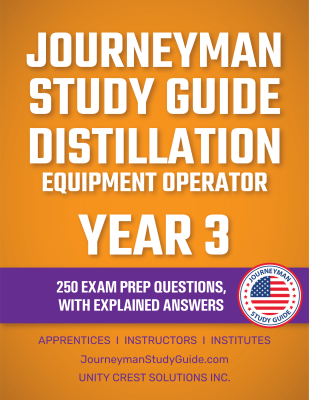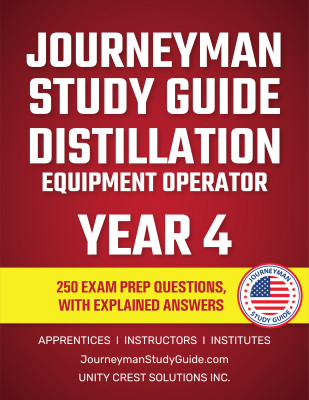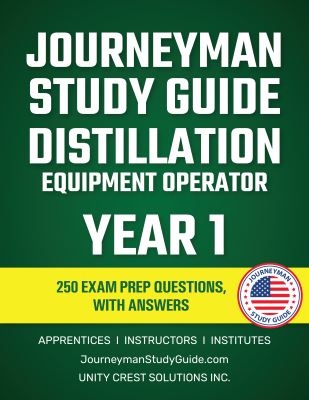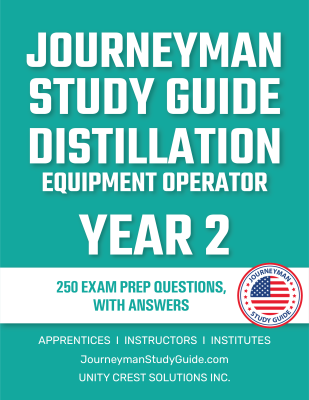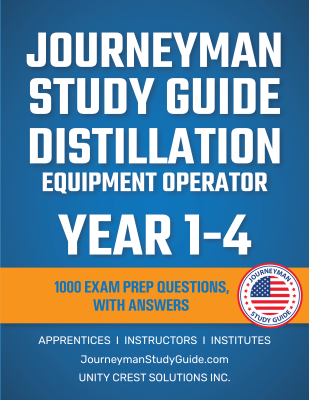Questions, Answers, & Explanations
Get clear explanations behind every answer, perfect for deeper learning and more thorough exam preparation.
Site Updates in Progress: Things might look different as we work on enhancing your experience.
What is a Distillation Equipment Operator?
A distillation equipment operator manages and maintains industrial distillation systems used in oil refining, chemical production, beverage alcohol manufacturing, and pharmaceutical processing. These professionals control temperature, pressure, and flow rates to ensure the safe and efficient separation of raw materials into purified products.
Key Responsibilities
Distillation equipment operators must apply technical knowledge and attention to detail to oversee complex distillation processes. Their daily responsibilities include:
Skills and Traits for Success
Successful distillation equipment operators need:
Industries Where Distillation Equipment Operators Thrive
These professionals work in industries that require precise chemical separation and purification, including:
Why Choose This Career?
Distillation equipment operation offers job stability, competitive wages, and advancement opportunities in major industries.
Get Certified and Advance Your Career
Proper training in distillation principles, safety protocols, and process optimization is key to career success. Our Q&A study materials, online tests, and certification prep guides provide the knowledge needed to excel as a distillation equipment operator.
What to Expect on the Distillation Equipment Operator Certification Exam
The Distillation Equipment Operator Certification Exam evaluates technical knowledge, safety awareness, and process control proficiency. Many employers, including ExxonMobil, Dow Chemical, and Jim Beam, require certification as proof of competency.
Exam Format
The certification exam consists of both written and practical components:
Key Topics Covered
Passing Requirements
Most certifying bodies require a minimum score of 70% to pass. Practical assessments may involve operating a distillation column simulator or troubleshooting process issues.
Tips for Effective Exam Preparation
Get Ready to Pass Your Exam
Our Q&A study guides, detailed explanations, and online tests help you build confidence and prepare for the Distillation Equipment Operator Certification Exam.
What Types of Questions Are on the Exam?
The Distillation Equipment Operator Certification Exam tests knowledge of distillation processes, safety regulations, and system optimization. Understanding the question formats helps candidates prepare effectively.
Common Question Formats
Sample Questions
Study Smarter, Pass Faster
Our Q&A products break down complex topics, while our Online Tests provide real-time performance tracking.
What Is It Like to Work as a Distillation Equipment Operator?
A career as a distillation equipment operator involves monitoring complex industrial systems, ensuring quality control, and maintaining strict safety protocols. Operators work in refineries, chemical plants, distilleries, and pharmaceutical manufacturing facilities, playing a crucial role in material purification and production.
Morning: System Startup & Process Checks
Midday: Production Oversight & Troubleshooting
Afternoon: Reporting & Shutdown Procedures
Challenges & Rewards
Ready to Start Your Career?
Prepare for a successful career with our study guides, Q&A products, and interactive online tests designed for distillation equipment operators.
What Are the Long-Term Benefits of a Career as a Distillation Equipment Operator?
This career offers high earnings, job stability, and opportunities for career growth. Operators can advance to lead technician, process engineer, or plant supervisor positions.
Career Progression
Top Employers & Career Opportunities
Union & Certification Benefits
Why This Career Matters
Distillation equipment operators are essential in refining crude oil, producing pharmaceuticals, and manufacturing industrial chemicals that power the economy.
Take the Next Step
Advance your career with our study guides, Q&A materials, and interactive online tests tailored for distillation operators.
Where Can You Train to Become a Distillation Equipment Operator?
Education programs in the U.S. provide hands-on training in distillation principles, process control, and industrial equipment operation. These programs prepare students for careers in oil refining, chemical production, beverage distillation, and pharmaceutical processing.
Types of Training Programs
What to Expect in Training Programs
How to Choose the Right Program
Advance Your Skills with Professional Training
Becoming a certified distillation equipment operator requires technical expertise, safety training, and hands-on experience. Our Q&A study materials and online tests reinforce key concepts and prepare for certification exams.
Why Join a Union or Work with a Reputable Employer?
Union membership and employment with established refining, chemical, and beverage distillation companies provide job security, competitive wages, and career advancement opportunities.
Benefits of Union Membership
Top Unions for Distillation Equipment Operators
Leading Employers Hiring Distillation Equipment Operators
What Employers Look For
How to Get Hired as a Distillation Equipment Operator
Why Unions & Employers Matter
Unions and reputable employers ensure stable employment, high wages, and ongoing training opportunities for distillation operators.
Secure the Best Career Opportunities
Enhance your employability by getting certified and joining a union. Use our study guides, Q&A materials, and online tests to ensure success in distillation industry exams.
How to Stay Ahead in the Distillation Industry
The distillation industry is evolving with advancements in automation, sustainability efforts, and safety regulations. Staying competitive in this field requires continuous learning, networking, and adapting to emerging technologies.
Emerging Trends in Distillation
Best Practices for Professional Growth
Challenges & Opportunities in the Industry
Staying Competitive in the Job Market
Success in the distillation industry depends on technical skills, industry adaptability, and continuous education. Our Q&A materials, Q/A Explanation guides, and interactive online tests help professionals reinforce knowledge and prepare for certification.
Get clear explanations behind every answer, perfect for deeper learning and more thorough exam preparation.
Quick and easy practice to test your knowledge anytime, anywhere—ideal for simple, on-the-go preparation.



